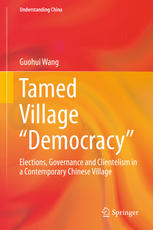

Most ebook files are in PDF format, so you can easily read them using various software such as Foxit Reader or directly on the Google Chrome browser.
Some ebook files are released by publishers in other formats such as .awz, .mobi, .epub, .fb2, etc. You may need to install specific software to read these formats on mobile/PC, such as Calibre.
Please read the tutorial at this link: https://ebookbell.com/faq
We offer FREE conversion to the popular formats you request; however, this may take some time. Therefore, right after payment, please email us, and we will try to provide the service as quickly as possible.
For some exceptional file formats or broken links (if any), please refrain from opening any disputes. Instead, email us first, and we will try to assist within a maximum of 6 hours.
EbookBell Team

4.8
104 reviewsWang's book offers an empirically rich and conceptually nuanced analysis of how local state agents maintain control over village self-governance in China. His careful analysis of primary documents enables him to explicate the formal mechanisms used by members of the local state to influence village affairs. Meanwhile, his rigorous and fascinating ethnographic data enable him to elucidate the manifold ways in which informal clientelist ties between local state officials and village elites permit the former to exert control. Overall, this excellent book powerfully demonstrates the need for scholars to go beyond attention to election processes when evaluating what village democracy means in a Chinese context. It is a must-read for all serious scholars of Chinese politics and society.
—Rachel Murphy, University of Oxford
Guohui Wang's highly original, in-depth case research vividly reveals the dynamics of contemporary Chinese village politics. By combining abundant empirical data with close observation as an "insider," his book illustrates the processes and consequences of transplanting 'democracy' into rural Chinese society. Particularly for those in the West who are keen on understanding the ongoing transformation of rural China, this book is a rich and revealing source.
—Shukai Zhao, Development Research Center of the State Council, P.R. China